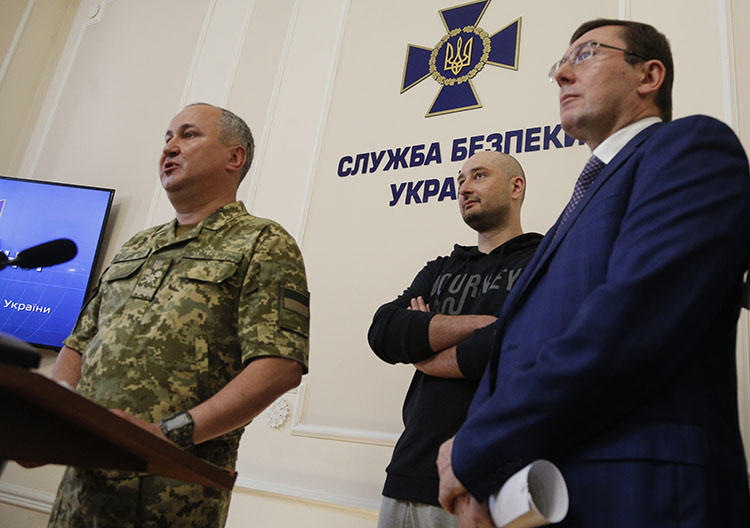Minutes after news broke that prominent Russian journalist Arkady Babchenko had been murdered in Ukraine, social media exploded with messages mourning the loss of a bright, sometimes-too-outspoken journalist. Friends and colleagues wrote moving obituaries, and groups including CPJ condemned the killing. Impromptu memorials in both Kiev and Moscow sprouted, as they all too often do, for fallen journalists in both of the once-brotherly-now-at-war nations.
A day later, it is clear that the Security Service of Ukraine (SBU) staged reports of Babchenko’s death, with the stated aim of saving the journalist’s life by thwarting a plot to assassinate him and exposing his would-be killers.
What we know:
- Babchenko, a Chechen war veteran-turned-journalist, is known for reporting from conflict zones, including in the North Caucasus and east Ukraine, as well as for sharp criticism of the Kremlin.
- After making highly controversial public comments on the December 2016 deadly crash into the Black Sea of a Russian military plane that carried choir performers to Syria, Babchenko reported receiving death threats.
- He left Russia in February 2017, initially for Prague, and eventually for Kiev.
- Babchenko has since October 2017 worked as a television anchor of the program, “Prime: Babchenko,” airing on the Crimean Tatar channel ATR.
- At a briefing today–led by SBU chief Vasyl Grytsak and including Prosecutor-General Yuri Lutsenko and the chief of National Police, Serhiy Knyazev–authorities said Babchenko’s murder was ordered by the Russian intelligence services and organized by an operative working on their behalf. They said the plot was a part of a larger conspiracy to assassinate Russian dissidents who had sought safe harbor in Ukraine.
- The Ukrainian authorities said a man, allegedly the plot’s organizer, was already in custody, and that the investigation unmasked all those involved in the would-be assassination, including the would-be triggerman and the crime’s mastermind.
- The authorities released a video recording of the alleged transaction between Babchenko’s alleged would-be killer, who they said was a Ukrainian war veteran, and the crime’s alleged organizer. They said the organizer promised the would-be killer $30,000, with a deposit of $15,000 made on camera.
- According to the local press, authorities said the alleged organizer also received from Russia and handed over to the alleged executor a dossier with detailed information about Babchenko’s journalistic activities and private life, including personal data on himself, his wife, parents and children; phone numbers and bank accounts; accounts on social networks; and passport information.
- There were no names of the alleged plotters nor concrete evidence given at the Ukrainian press conference.
- The SBU produced Babchenko, who told a group of stunned journalists gathered at the press conference that he was aware of the plot for the past month and agreed to participate in the operation to thwart it because “there was no other way.” He thanked the SBU and other law enforcement for “saving my life.”
What we want to know:
- How imminent and credible was the alleged threat to Babchenko’s life?
- What evidence does the SBU have that the Russian security service orchestrated the alleged assassination plot?
- What evidence does Ukraine have against the alleged organizer and alleged contract killer?
- Who is the alleged mastermind of the plot?
- What is the identity of the alleged organizer in custody?
- What is the identity of the alleged contract killer? Where is he?
- Why did the SBU need to go to the extreme measure of announcing Babchenko’s murder in order to stop the alleged plot and arrest the alleged organizer?
- Who in the Ukrainian government was aware of the operation?
- Why did authorities publicly blame the Russian security services for the alleged assassination plot prior to completing an investigation and charging the suspected plotters?
- How much did Babchenko know of the alleged threat on his life, and to what evidence was he privy?
- How much did Babchenko’s wife know, and when?
What are the potential press freedom implications?
These depend on the answers to the questions above, which is why CPJ has not yet taken a position.
We are greatly relieved that Babchenko is alive. We recognize that Babchenko participated in the ruse and said he would not be alive without the SBU’s intervention.
At the same time, this extreme action by the Ukrainian authorities has the potential to undermine public trust in journalists and to mute outrage when they are killed. CPJ takes a dim view of law enforcement impersonating the media, but the parallels in this case are not yet fully known.
What is known is that the Ukrainian government has damaged its own credibility. And given the SBU is an intelligence agency, which engages in deception, obfuscation, and propaganda, determining the truth will be very difficult.
